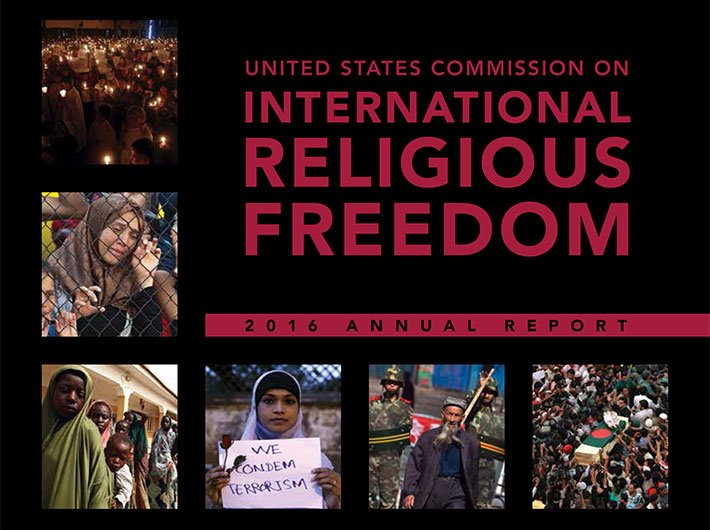Since BJP assumed power, minorities subject to derogatory comments by BJP politicians, says US commission’s scathing report
There are many people who believe that after Anupam Kher’s spirited defence of the prime minister at a debate in Kolkata, it is proven that there has been no intolerance in India. But the US Commission for International Religious Freedom (USCIRF) decided to go by facts and has come up with the conclusion that the situation is quite worrisome here. “India is on a negative trajectory in terms of religious freedom,” it has concluded.
“In 2015, religious tolerance deteriorated and religious freedom violations increased in India. Minority communities, especially Christians, Muslims, and Sikhs, experienced numerous incidents of intimidation, harassment, and violence, largely at the hands of Hindu nationalist groups,” says the report for 2015, released last month.
Further, it minces no words in pointing out who’s behind it. “Members of the ruling Bharatiya Janata Party (BJP) tacitly supported these groups and used religiously-divisive language to further inflame tensions.”
Also, “Since the BJP assumed power, religious minority communities have been subject to derogatory comments by BJP politicians and numerous violent attacks and forced conversions by affiliated Hindu nationalist groups. . .” That refers to repeated and unchecked anti-minority statements from what used to be described as the Hindutva fringe elements but now happen to be not so fringe after all.
In the seven pages devoted to India in the 276-page report, the USCIRF recaps all the headlines and keywords: atrocities targeting dalits and religious minorities, restrictions on cow slaughter, forced conversions, anti-conversion laws, cancelling NGO’s licences under the Foreign Contributions (Regulations) Act, communal riots and restrictions on temple entry.
“In the last year, ‘higher caste’ individuals and local political leaders also prevented Hindus considered part of the Scheduled Castes and Scheduled Tribes (Dalits) from entering religious temples. Additionally, the national government or state governments applied several laws to restrict religious conversion, cow slaughter, and foreign funding of NGOs… Based on these concerns, USCIRF again places India on Tier 2, where it has been since 2009. However, USCIRF notes that India is on a negative trajectory in terms of religious freedom.”
USCIRF has noted that it will continue to monitor the situation closely during the year ahead to determine if India should be recommended to the US State Department for designation as a ‘country of particular concern,’ or CPC, under the International Religious Freedom Act (IRFA) for systematic, ongoing, egregious violations of religious freedom.
Other highlights of the report
- “Christian communities, across many denominations, reported numerous, and increased, incidents of harassment and attacks in the last year, which they attribute to Hindu nationalist groups with the BJP’s tacit support.”
- “Observers note that [anti-conversion] laws create a hostile, and on occasion violent, environment for religious minority communities because they do not require any evidence to support accusations of wrongdoing.”
- “The Indian courts are still adjudicating cases stemming from large-scale Hindu-Muslim communal violence in Uttar Pradesh (2013) and Gujarat (2002); Hindu-Christian communal violence in Odisha (2007–2008); and Hindu-Sikh communal violence in Delhi (1984).”
Recommendations to the US government
- Integrate concern for religious freedom into bilateral contacts with India, including the framework of future Strategic Dialogues, at both the federal and provincial level, and encourage the strengthening of the capacity of state and central police to implement effective measures to prohibit and punish cases of religious violence and protect victims and witnesses;
- Increase the US Embassy’s attention to issues of religious freedom and related human rights, including through visits by the Ambassador and other officials to areas where communal and religiously-motivated violence has occurred or is likely to occur and meetings with religious communities, local governmental leaders, and police;
- Press the Indian government to allow USCIRF to visit the country, and urge the United Nations Special Rapporteur on Religious Freedom or Belief to visit India;
- Urge India to boost training on human rights and religious freedom standards and practices for the police and judiciary, particularly in states and areas with a history or likelihood of religious and communal violence;
- Urge the central Indian government to press states that have adopted anti-conversion laws to repeal or amend them to conform with internationally-recognized human rights standards; make clear US opposition to laws that restrict freedom of thought and association; and
- Urge the Indian government to publicly rebuke government officials and religious leaders that make derogatory statements about religious communities.
Read the full report
here
